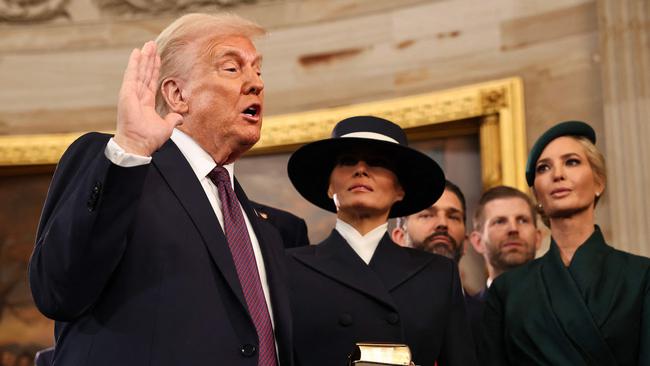Trump’s first 100 days: MAGA faithful spur ‘revenge’ campaign
Few have spent more time than Frank Luntz trying to understand what drives Donald Trump’s fervent support and what his presidency means for the future.

Few have spent more time than Frank Luntz trying to understand what drives Donald Trump’s fervent support and what his presidency means for the future.
Fresh from his latest focus group with supporters of the President, to mark the approach of Trump’s 100 days in office on Tuesday, the veteran political analyst has made his verdict.
One word encapsulates a phenomenon that could shape the century – and not just in the US. What we are seeing is a “dealignment” from traditional political, intellectual and economic allegiances.
“It’s a rejection of the governing institutions and the people who lead them,” Luntz, 63, says.
What comes through in the focus groups, which can be watched in full on the Straight Arrow News website, is the animus felt by Trump voters towards the institutions that underpin American society; from congress to colleges and banks to businesses.
As Joe from Missouri puts it: “How do all these [members of] congress and senators become millionaires when they’re supposed to be working for the people? ‘I’m a public servant.’ Bullshit. You’re an inside trader. You’re getting kickbacks.”
Luntz says this level of hostility towards institutions, and the perceived elites that run them, has reached breaking point. “The very moment that Trump has re-ascended to power is the very moment that our institutions are at their weakest and the public is at its angriest,” he says.
“That is leading to a rejection of the status quo and embrace of anything that says change.”
Mike from Pennsylvania sums up what he likes best about Trump: “The exceptionalism and his tenacity and just kicking ass and taking no prisoners. That’s what we elected him to do.”
The institutions rejected by Trump voters are those that historically held the American president to account. “Accountability is essential in a functioning democracy but the media has lost the ability to hold the administration accountable by the way it’s covered it,” Luntz says. “Congress has not been challenging the administration in any meaningful way, and I’m waiting to see what happens with our legal system.”
Asked what Trump should do next, Christy from Maryland says: “Trump was injured. We care about him. We care that he was getting attacked at all these times. We want people to go to jail for this.”
Luntz is surprised by the strength of feeling. “They want to hold judges accountable. They want to hold congress accountable – not just to defeat them, but to punish them,” he says. “It’s a value I’ve never seen in American politics until now, that desire to punish your opponent.”
One of the most powerful dealigning forces is the devotion of Trump’s supporters. “I have talked to Trump voters who in one moment will say they love him because he sticks to his guns; he doesn’t yield, he doesn’t break. Fifteen minutes later, the same person will tell me that they love his flexibility.”
The tariff policy is a clear example of this willingness to hold contradictory positions out of support for Trump. The top reason voters give for supporting the President is his stewardship of the economy. Yet their superannuation is being depleted as the markets are shaken by tariffs that threaten to make goods more expensive.
Luntz believes JD Vance will ensure the Trump phenomenon outlives the President. Vance’s reputation among the MAGA faithful has grown since the vice-presidential debate. “He presented an ideology behind the Trump cult of personality. Vance found a way to take all the individual aspects of Trump’s policies and put them in a way that will outlast Trump.”
But Luntz has found concerns among independent swing voters. “That 20 per cent wants a reduction in government spending and they want a reduction in bureaucrats. But … they want it done with a scalpel, not a sledgehammer.”
Luntz does not think the US is unique. “We’re seeing a dealignment all throughout the globe,” he says. “This is because of social media, because of economic dislocation, because of greater migration and because of insufficient education. All of those elements are playing a role in pulling us apart from the ideologies and the parties and even the people that we have supported.”
THE TIMES



To join the conversation, please log in. Don't have an account? Register
Join the conversation, you are commenting as Logout